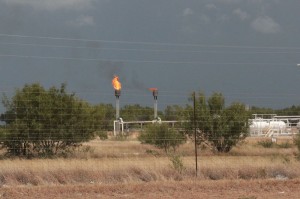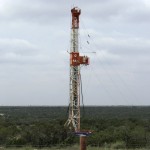New Federal Regulation Coming For Oil and Gas Well Pollution

Photo by Dave Fehling.
Oil & gas facilites in LaSalle County, part of the Eagle Ford Shale.
The federal government says the oil & gas industry is the largest industrial source of pollution that creates smog. In coming months, Texas drillers could learn what the government plans to do about it.
New pollution rules could mean that thousands of oil & gas wells in Texas will have to have their leaks fixed.
“It’s an issue because we’re now drilling in heavily populated areas,” said Melanie Sattler, a researcher at the University of Texas in Arlington.
She’s directed research projects in North Texas where thousands of new gas wells have been drilled in recent years. Some of the air pollution is coming from all the diesel trucks and generators needed to drill and service wells. But other toxic vapors andgreenhouse gases including methane are leaking from the well sites and pipelines themselves.
In the North Texas city of Denton, wells have been drilled near schools and parks.
At a Denton public meeting earlier this summer, resident and industry-opponent Cathy McMullen read from a phone log of complaints called into the state’s drilling regulator: “Caller is responding to a haze over the neighborhood and thinks it’s related to gas well flaring. Caller is experiencing headaches.”
What’s in that haze? One major component of air pollution at drill sites is the natural gas itself which is made up mostly of methane.
“Which is a highly potent greenhouse gas, it’s kind of a super-pollutant,” said Matt Watson, with the group Environmental Defense Fund. “Texas has led other states when it comes to regulating the oil and gas industry but when it comes to methane emissions, we’re trailing behind.”
EDF is asking Texas to mimic states like Colorado, which earlier this year passed the nation’s first regulations aimed at reducing methane losses from drill sites and pipelines. In Texas, the Commission on Environmental Quality said in an emailed response to us that it has no plans to enact such rules. But the federal Environmental Protection Agency does and Texas drillers would have to comply.
The EPA tells us that in the next couple of months it will announce how it might proceed with nationwide regulations to reduce methane leaks.
The EPA also says it will announce updates to regulations put in place in 2012 that were aimed at reducing other toxic releasesfrom drilling; releases that include smelly sulfur dioxide and the potential cancer causer benzene. Those rules too have come under fire from Texas regulators. The Texas Commission on Environmental Quality said the new rules would cost the Texas energy industry far more than the EPA estimated. For example, the TCEQ said just one of the many new requirements would mean oil & gas wells statewide would have to be fitted with three-quarters of a million new valves. But the researcher say there’s a good reason old valves need replacing.
“The pneumatic valves in particular are actually designed to leak methane when they operate,” said Melanie Sattler at UT. She said new, higher-tech ones leak a lot less and could make a smaller contribution to global warming and smog. And environmental groups including EDF have pointed out that many of the companies that supply such valves and other methane-controls are based in Texas.

